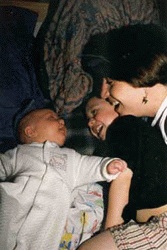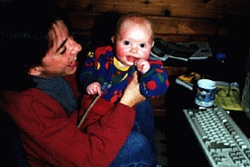|
Some parents snuggle their babies. We jiggled, bounced and jostled ours. Baby in a front-carrier. Baby in a backpack. Sleep: for him, the bare minimum. For us: even less. Into this colicky world of red eyes and worn floorboards came books -- funny, sweet, rhythmic, wonderful books.
As a baby, Aryeh trained us well. Since he stopped crying whenever we read aloud, we read to him at every available opportunity. Stories — repetitive and predictable, but always involving — seemed to sand down some of the extra barbed-wire nerve endings our son was born with. Literature became for our family a mellowing agent, an alternative to zombifying television and overprescribed pharmaceuticals.
 |
| Andromeda, Tziporah and Aryeh Lax |
 |
On family reading nights, which outnumber our video nights at least five to one, Aryeh will listen for two hours or more as my husband Brian reads aloud from "Water & Light," a nonfiction narrative about coral reefs, or "A Family Place," Charles Gaines' book about building a house -- and dealing with mid-life angst -- in Nova Scotia.
This, we know, is not typical kindergarten fare. But it's the kind of literature Aryeh, now 5, chooses. "Don't you want to read about sharks and fish, Mom?" he'll ask if I hesitate at the library, physically and mentally weighing a hefty adult book I know may take 12 weeks to read aloud. "Don't you want to learn how to build a house?"
When Aryeh isn't hunched quietly over his own more age-appropriate reading — a chapter book by James Marshall, or James Gurney's "Dinotopia" — he reverts to his stimulation-seeking, high-pitched persona. (Colic, we've discovered, doesn't go away, it just mutates.) He'll climb the couch, accidentally knocking framed photos off the walls. He'll transform into a snarling velociraptor. Even when he doesn't mean to offend, he can't stop squirming, angling his prone, sprawling body into my path as I'm trying to cook dinner. Sleep is a waste of his time. Meals taste better standing up. Phone conversations with Nana are best conducted while walking in brisk, tight circles that exhaust not only him, but anyone watching from the sidelines. Only books break the cycle completely, saturating Aryeh's intellect enough that he is able to comply with our rules for read-aloud time: sit still, be quiet, ignore your baby sister's antics, and pay attention.
So far, I've addressed only one aspect of family literacy: shared reading as healthful sedation. That is what we've given to Aryeh, in the form of books, word games, cooperative writing projects, and all the calming, creative banter our reading has inspired. But he has given something entirely different to me. Where I have presented him with language as medicine for the frenzied body and the agitated soul, he has given it back to me as pure candy. (M&Ms are his weakness; chocolate-covered cherries are mine.) Who cares whether or not it's good for you? That's not the point.
As a writer and journalist, I sometimes become jaded. I pump out words for cash. Occasionally I write long factual pieces that grunt and wheeze along, refusing to sing, refusing (some readers might think) even to end. When I am lost in that sea of words—words that will be printed and tossed, endless words that run off the page, that rub off on your hands—Aryeh saves me.
 |
| Andromeda and Aryeh Lax |
 |
Every word, every character to him is precious. (He's always drawn his R's as if they are line-dancing toward the margins, chunky-heeled front legs lifted in a chorus line kick.) His eyes twinkle at the discovery of punctuation. He adds an exclamation mark to something he has written all in capitals, on a wrinkled sheet of paper. "I changed it," he says with pride, admiring his sentence. "Now it shouts!"
Without missing a beat, Aryeh transfers his enthusiasms from punctuation to Chinese. He enjoys seeing how, in this exotic language, a word can be a picture, and a picture, a word. Art, Egyptian hieroglyphics, Roman numerals, codes, or plain old English words: they're all the same to him. Nothing more or less than magic.
We read a children's book together, and I am reminded that I did not rediscover poetry until after Aryeh was born. Sharing children's verse with my son taught me anew that the point of poetry is not intimidation or abstraction, but surprise and delight. Kids' books, more than adult books, break rules with abandon. Shakespeare felt free to invent his own words; so did Dr. Seuss. And so does Aryeh. He can spend an entire evening labeling his monster drawings with new words he has created. When will I have the courage to invent my own words?
Language is play; language is alchemy. Too often, I forget. Then Aryeh reminds me, and it's as if I've bitten into one of those chocolate-covered cherries. With the too-sweet syrup on my tongue and the sugar coursing through my veins, I'm ready to inject a little more creativity into my own prose, to see the world itself in a more animated way.
Our family reads together; we write together. Aryeh's sharp edges are softened, my dulled senses are sharpened. Somehow we and the world, with all its wonderful possibilities and diverse rhythms, come better into sync.
|
 |
|




